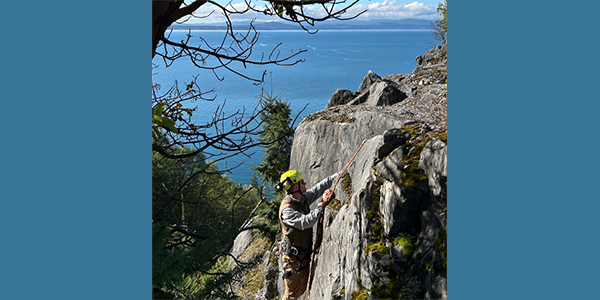||| FROM VALERIE A. JUSELA |||
San Juan County’s residents face possibly crippling liabilities from county failures thus far to effectively regulate short-term or “vacation rental” permittees in our community.
As a career business analyst in the areas of taxation, contracts, and insurance, I have found mounting evidence that dire liabilities lurk in the regulatory shadows, potentially threatening the county’s financial viability and the well-being of all its citizens.
I will highlight three regulatory areas of concern: liability insurance, private roads, and communication infrastructure.
Liability Insurance
The plain language of WA state law – specifically RCW 64.37.040 and RCW 64.37.050 – requires short-term rental operators to carry “liability insurance . . . in the aggregate of not less than one million dollars . . .” Inexplicably, these two code sections are not referenced in San Juan County’s VR Permit Application nor in the annual VR Certificate of Compliance. Thus, the county seems to have no data on the adequacy of commercial general liability coverage where it is needed most and legally required.
This non-enforcement exposes the county and its residents to uninsured liability in the event of an accident or fire. A single lawsuit could force the county into receivership. All residents would bear a fearsome financial cost to settle such a judgement.
When Chelan County looked at this, the Chelan Short Term Rental App was afforded a simple fix by adding almost universally-required “penalty of perjury” language to “. . . certify (or declare) under penalty of perjury under the laws of the State of Washington that the foregoing is true, correct and complete.” In fact, Chelan County’s 2021 Short Term Rental Code provides a comprehensive model, is legally sound, and covers all of the requisite bases; Fire and Safety Inspection, Insurance, and Building Code Regulations.
Private Roads, Road Associations, and HOAs
San Juan County’s now one-year old VR moratorium completely lacks protection for designated Rural Residential or Rural Farm Forest areas, and we have no assurance that eventual new regulations will do better. But these areas still need medivac and emergency service. Meanwhile, our recent mix of flooding and deep-freeze temperatures exposed the vulnerability of our private roads, many of which became temporarily impassable.
Yet, there is no shortage of short-term rentals and their guests on our vulnerable private roads. When the eventual – or inevitable – accident-followed-by-lawsuit happens, both the county and these private associations will likely be named. If non-compliance with county road standards and VR traffic are judged to be causal, private roads could lose their insurance and be placed in surplus lines which would starkly increase their premiums as much as 25-fold.
The ultimate financial burden falls on us, the county residents.
Landlines
Lastly, in the effort to keep our island guests safe, all short-term rentals must have a working landline. The lives and safety of island guests are simply too dear to depend solely on cell phone technology and reliability. In any emergency, a guest must have layers of communication infrastructure available.
In summary, the San Juan County Planning Commission and our County Council need to integrate basic community liabilities into their efforts at regulatory reform. All our residents and guests alike deserve these essential protections.
**If you are reading theOrcasonian for free, thank your fellow islanders. If you would like to support theOrcasonian CLICK HERE to set your modestly-priced, voluntary subscription. Otherwise, no worries; we’re happy to share with you.**








Hello, Chicken Little. Even the most aggressive personal injury lawyers would be hard-pressed to sustain these fevered claims.
State law requires the property owner to have insurance. I’m struggling to see how the County can be sued or forced into receivership for “failing” to enforce a state statutory requirement like this.
The County is not responsible for private roads. Owners and HOAs are. A lawsuit against the wrong party would be dismissed.
There is no requirement that short-term rentals have a working landline. Nothing, neither code nor tort law, requires landlines.
Paranoia strikes deep
Into your life it will creep
It starts when you’re always afraid…
(from ‘For What It’s Worth’ by Stephen Stills)
The new law was only adopted in 2019. When a fire starts, and the owner is found not to be fully insured for all the damage and the County fails to enforce the state statutes and grants a permit they may or may not be held liable. I did not find any cases based upon the new law. However, homeowners and homeowners’ associations will most definitely unfairly bear the burden of liability in the event of a fatal accident or fire. You only need to look at the liability of the utility in California that recently filed bankruptcy after its equipment started a fatal fire.
When a large fire spreads to the trees and neighboring homes the liability will be enormous, and the homeowners will pay the price if the party responsible is under insured. We have a model in place with existing hotels and resorts that requires fire safety measures such as sprinklers, fire hoses, fire alarms and commercial insurance. However, this county has decided the commercial tourist activity can take place in rural areas without the infrastructure required by hotels and resorts who pay taxes and provide employment locally.
Insurance is important. The View Have Estates Homeowners Association Board, of which I am a member, worried about this question when the first vacation rental permit was applied for in our development several years ago. What if a visitor, who is unfamiliar with our roads and probably driving over the 15 mph speed limit, runs off the road and tumbles down the hill in the middle of the night, leading to a death? That could become the liability of the Association, and if a judgment exceeds the level of our liability insurance, the excess would become the liability of its approximately 50 property owners. A million dollars divided by 20 equals $20,000 per property.
I checked RCW 64.37.050 and it indeed requires a short-term rental property have “liability insurance . . . in the aggregate in excess of one million dollars,” as Ms. Jusela writes. And a knowledgeable person tells me that such insurance cannot merely be an ordinary homeowners policy, it has to be a policy specifically written for a commercial rental operation. But does the county check carefully when issuing the vacation rental permit or its annual certificate of compliance? I’d bet it does not.
Fortunately, the two VR-permitted properties in our development have not (yet) had any short-term renters, so this question is moot.
Correction: a million dollars divided by 50 (not 20) equals $20,000 per property.